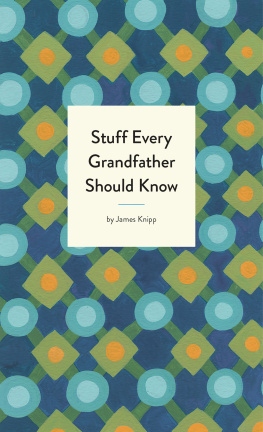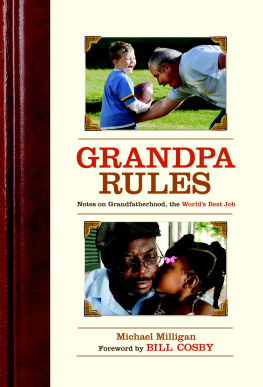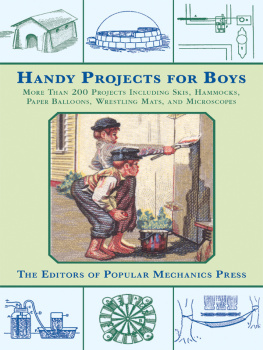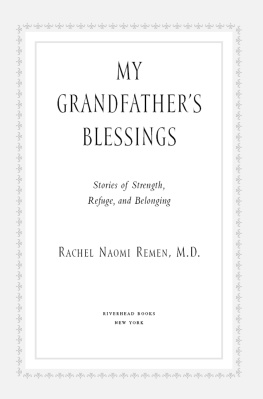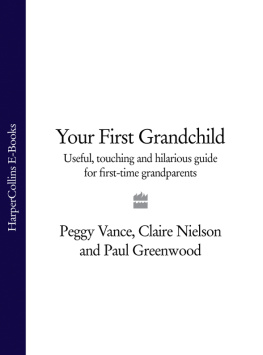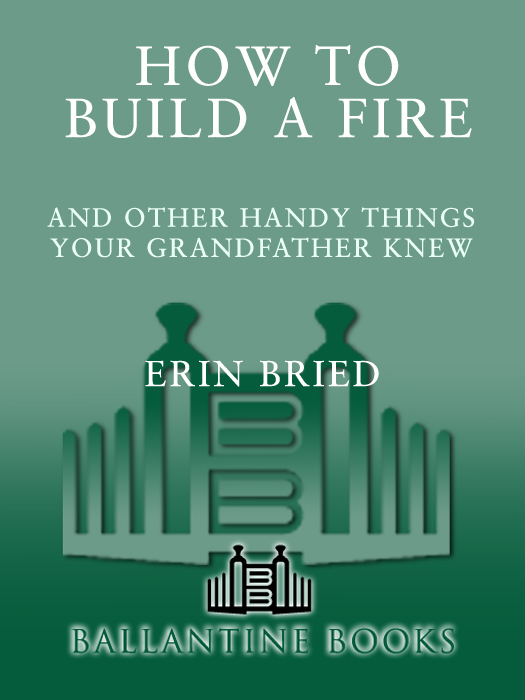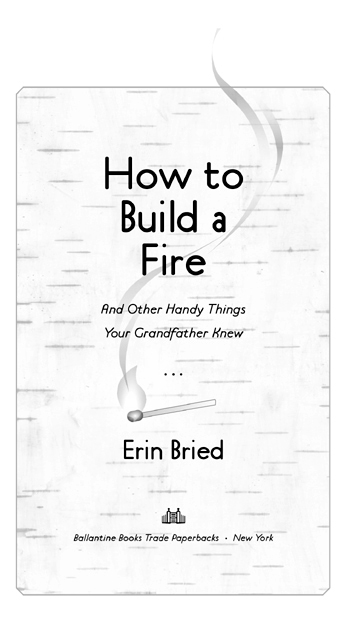A Ballantine Books Trade Paperback Original
Copyright 2010 by Erin Bried
Illustrations copyright 2010 by Simon M. Sullivan
All rights reserved.
Published in the United States by Ballantine Books, an imprint of The Random House Publishing Group, a division of Random House, Inc., New York.
B ALLANTINE and colophon are registered trademarks of The Random House Publishing Group, a division of Random House, Inc., New York.
LIBRARY OF CONGRESS CATALOGING-IN-PUBLICATION DATA
Bried, Erin.
How to build a fire : and other handy things your grandfather knew /
Erin Bried.
p. cm.
eISBN: 978-0-345-52510-9
1. MenLife skills guides. I. Title.
HQ1090.B744 2010
646.70081dc22 2010037682
www.ballantinebooks.com
v3.1
T O P OPI , G RANDPA N ORM ,
P OPPOP , G RANDPA B.,
AND ALL GRANDFATHERS EVERYWHERE
Contents
Introduction
Every generation revolts against its fathers and makes friends with its grandfathers.
Historian and philosopher L EWIS M UMFORD
I only knew one of my grandfathers, and though I loved him, I didnt know him very well. When my family managed to make the two-hour car trip to visit him, my older sister and I would greet him with hugs and kisses and then dash off to his two-tiered electric organ, where wed plug in the giant headphones, bang away at the keys, and toy with the rumba beats until it was time to leave. When I think about my memories of him, only two really stand out: When I was little, he let me occasionally shine his bald head with a rag, and when I was in college he taught me to play a few chords on his guitar. In what I now realize was an act of supreme generosity, he even let me borrow his beloved Gibson so I could practice. I still have it. I still play it. And I still wonder what else he wouldve taught me, if only Id asked.
The fact is, for whatever reason, many of us didnt ask (or even think of asking) our grandfathers about their lives. Maybe we were too young, or too timid, or even too arrogant, assuming we were smart and they were just, well, old. Since the days our grandfathers were born, weve invented television, the computer, the Internet, the iPod, the cell phone, the flu shot, hybrid cars, the GPS, and even the Large Hadron Collider. Heck, all of us were born in homes with electricity and indoor plumbing, and many of our grandfathers, as boys, were still finding their way by kerosene lamps and using outhouses. Youd think all of this progress would have made us a smarter, safer, more sustainable society. And yet weve somehow lost our way.
Think about it: With incredible thumb dexterity, we can make our video game avatars run, jump, punch, and shoot, but what do we really know about being brave in the face of danger? We email, chat, tweet, and share our status updates with the world at a frenzied pace, but would we even begin to know how to write a personal love letter? Would it even occur to us? We know how to program our iPods, but we dont know how to make our own music, or for that matter any of our own entertainment. We can memorize and repeat the talking points we hear on talk radio, but weve forgotten how to think critically and have our own big ideas. We take our civil rights for granted, but we often forget to be civil to one another. We hold opinions about who should win Top Chef and The Bachelor, and yet very few of us actually know how to catch a fish (much less cook one) or make a marriage last a lifetime. We buy fancy cars and drive them everywhere with absolutely no idea how to fix them if they break. We invest in big houses without knowing how to paint the walls or even, in some cases, clean the rooms. We, as a generation, are so proud of our accomplishments, our technology, our wealth, and yet we have absolutely no idea about half the stuff were doing.
This is not sound footing. Its time to get back to basics and regain a sense of self-sufficiency before its too late. And sometimes in order to move forward, youve got to look back. As members of the Greatest Generation, our grandfathers were defined not only by the Great Depression, but also by their heroic service to the country in World War II. Courageous, responsible, and involved, they understand sacrifice, hard work, and how to do whatever is necessary to take care of their loved ones. True, weve got Twitter down pat, but our grandfathers can teach us almost everything else we need to know.
Im certainly not saying that all of us are completely inept in the grandfatherly arts. Take me, for example. Even though I never got a chance to really talk with my grandfather and I spend most of my time interviewing celebrities and writing profiles of them for my job at Cond Nast, Ive managed to accomplish a few back-to-basics things I think would make him proud. After saving every penny for seven years, I bought my own apartment, a Brooklyn fixer-upperwhich is a very nice way of saying a dump. I hung drywall, painted, installed molding, exposed brick, and made it a home. Because I love an ice-cold beer on a hot summers day, I learned to brew my own (though sometimes with mixed results). Ive spent the past five summers on Lake Erie fishing for walleye and, on the days when I get lucky, cooking them for dinner. Ive managed to change two or three flat tires, though thankfully not all at the same time. Still, despite my efforts, Ive only begun to scratch the surface of self-sufficiency, and there is a great deal I have yet to learn.
Because my own grandfathers are no longer alive, I reached out to ten others from all across the country to see what I could find out. The first lesson came quickly. When I called each of them and explained that I had written a book called How to Sew a Button: And Other Nifty Things Your Grandmother Knew and was now writing my second book, this one about grandfathers, they immediately asked how they could help. None of them asked how I found them. None of them questioned their own knowledge. They each literally did what they were called upon to do, and once I got them talking, they didnt stop.
From the day I was born, whenever anybody asked me what I was going to do, I said, Im going to be a pro ballplayer, Robert Kelly, eighty-two, told me. In 1948, at age twenty-one, he was signed by the Chicago Cubs, and over the course of his career he also pitched for the Cleveland Indians and Cincinnati Reds. Boy, dont you think that was a thrill when I ended up playing for the Indians and standing in the middle of Cleveland Stadium against the Yankees? I took time to walk off the mound and look around the ballpark and gather it all in. Its still etched in my memory. The emotion I felt standing on the mound, facing Mickey Mantle. I was in awe!
Charles Tatum, eighty-three, who was featured in the HBO miniseries The Pacific, had plenty of war stories. At seventeen, he enlisted in the marines, where he served under the leadership of famous war hero John Basilone, who won the Medal of Honor. They fought together in the battle of Iwo Jima, where Basilone was killed and Tatum, a machine gunner, earned a Bronze Star for his valor. I asked him how he found his courage. We were trained to be soldiers. Everybody in war is afraid or scared, but I was different, he said, joking. I was petrified. Then, more seriously, he explained how to be brave. Even though you were scared, you were trained to do what you had to do. You didnt want to let your buddies down. You counted on them, and you knew they were counting on you. So, you had to put up.


